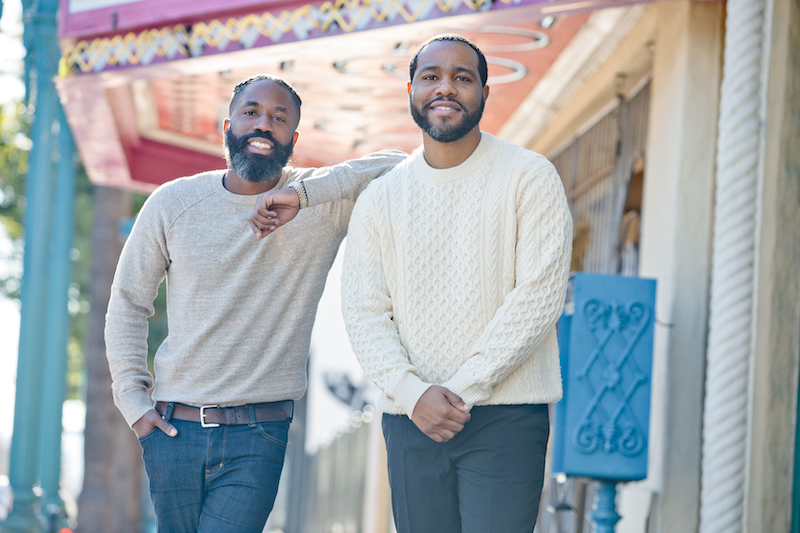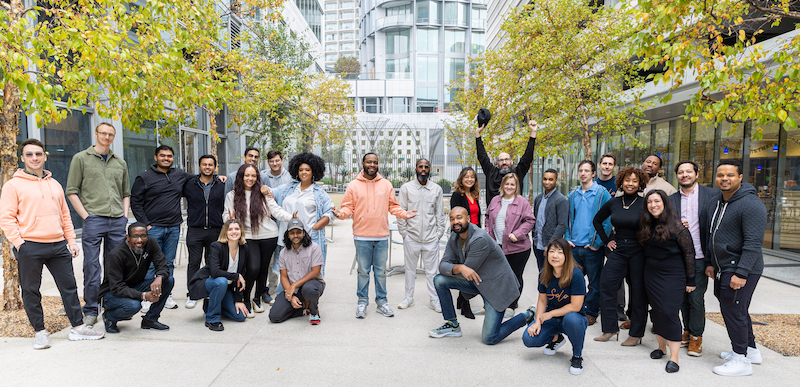
Co-founders Rodney Williams & Travis Holoway
After the LIFToff Financial Impact Challenge, SoLo Funds received an investment from Comcast NBCUniversal LIFT Labs to further their mission of bringing more equity and opportunity to short-term lending.
Rodney Williams and Travis Holoway are on a mission to make lending more equitable. In underbanked communities like theirs, they noticed family and friends relying on check-cashing operations or payday loan businesses to handle financial needs. There weren’t any fair, reputable options when people sought short-term loans.
The problem is magnified for people of color. Black and Latino people are more likely to be unbanked — meaning no one in their home has a checking or savings account. A Federal Deposit Insurance Corp. survey found that, of the 7.1 million unbanked American households, 13.8% are Black, and 12.2% are Hispanic, compared to just 2.5% of white households. The survey also cited a distrust of the banking system as being a top reason for not having bank accounts.
The problem led Williams and Holoway to launch SoLo Funds, a financial marketplace connecting lenders and borrowers. The Black-owned startup empowers its growing community to work together to create mutually beneficial outcomes where members improve their financial health. Borrowers can use the platform to outline why they need the capital, select the loan amount, payback date, and tip for the lender in place of paying interest. Most borrowers request short-term loans for unplanned expenses like car repairs or medical expenses and typically get funded within 30 minutes. The lenders are individuals — not banks — who can scroll through the online marketplace and pick loans they’d like to fulfill.
There have been approximately 200,000 loans through the platform, and 82% of members are from underserved communities. Nearly 60% of borrowing members self-identify as Black, Indigenous, or people of color.
“We are taking the power from lenders and giving it to borrowers,” said Williams.
LIFToff Financial Impact Challenge
SoLo Funds recently received an investment from Comcast NBCUniversal LIFT Labs through the LIFToff Financial Impact Challenge. The challenge aimed to find early- to mid-stage FinTech startups enabling capital and credit opportunities for underrepresented communities.
SoLo Funds plans to use the money to make key engineering hires to bolster its technology.
“The challenge was a perfect fit for us,” said Williams. “It’s a huge testament to Comcast NBCUniversal that a company that large cares about our mission.”

From Idea to B Corp
SoLo Funds, based in Los Angeles, is the only Black-owned financial services Certified B Corp in the United States or Canada. Being B Corp certified signifies the company’s commitment to driving social and environmental impact and being a force for good. The startup even recently launched SoLo Causes which makes donations to nonprofits.
SoLo Funds also teaches financial literacy with each transaction. As people borrow and lend, they learn about interest and financing and can ultimately become smarter about money matters. For example, the loan timelines are 35 days or shorter because good credit is built by quickly paying debts back — not dragging them out and accruing interest.
“I have really good credit because I pay my debts off in full. I only spend what I can pay back in a short period of time. If you want to teach financial literacy, that’s what you should teach,” said Williams. “That’s why we keep our loan terms short.”
If a borrower fails to repay a loan — even once — they are no longer allowed on the platform. Lenders can opt-in to lender protection for a fee, so they get their money back guaranteed. To assess a borrower’s ability to pay back loans, SoLo considers bank data (not credit score), examining credits and debits for the past 24 months. Williams says borrowers pay back SoLo Funds loans three times more than other financial institutions.
SoLo Funds is different from other banks because it is truly a community, he adds. In fact, 30% of lenders have become borrowers themselves.
“We’re not there to prey on you. We don’t want you to use us every month. The community is here when you need us, and we will support you. And when you have discretionary capital, you should lend to someone else in need. That is how you pay it forward.”
![]()
To read more inspiring startup stories and to stay connected to Comcast NBCUniversal LIFT Labs, sign up for our newsletter and follow us on Twitter.
